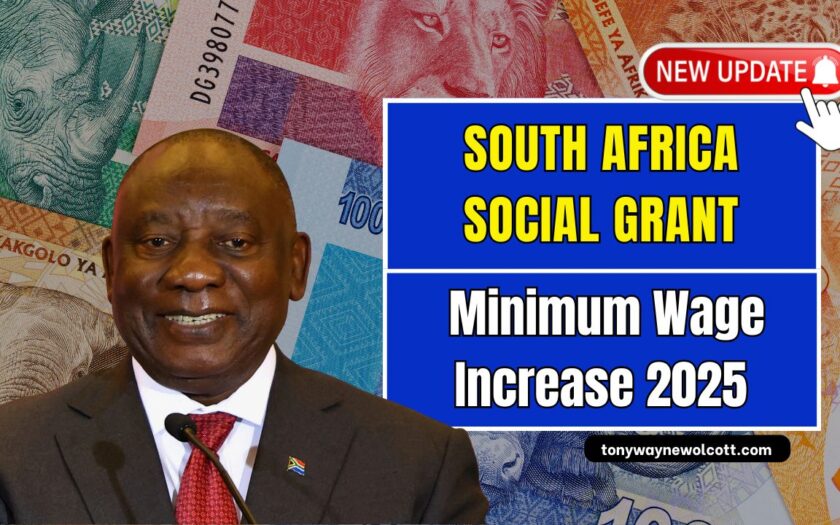In 2025, South Africa is taking bold steps to support its most vulnerable citizens by raising social grant payments and increasing the national minimum wage.
These changes aim to ease the pressure of rising living costs, provide greater financial relief, and promote economic stability across the country.
Millions of South Africans, including pensioners, disabled individuals, caregivers, and low-income workers, will directly benefit from these updates.
This article breaks down everything you need to know about the latest payment increases, who qualifies, how much more you’ll receive, and what this means for households nationwide.
These adjustments are part of a broader government effort to strengthen the social safety net and reduce income inequality in South Africa.
As inflation continues to impact household expenses, both grants and wages are being revised to better meet the needs of everyday citizens. Let’s explore all the key facts, figures, and future implications.
Social Grants Upgraded from April 2025
Starting 1 April 2025, multiple social grants were raised:
- Old‑age & Disability Grants increased from R2,185 to R2,315 (+R130)
- War Veterans Grant rose from R2,205 to R2,335 (+R130)
- Care Dependency Grant and other linked grants also raised to R2,315
- Foster Care Grant went up from R1,180 to R1,250 (+R70)
- Child Support & Grant‑in‑Aid both climbed from R530 to R560 (+R30)
These increases reflect the government’s commitment to improving the social safety net for millions. Around 19 million people are expected to benefit from this expanded grant coverage in 2025/26, ramping up to 19.3 million by 2027/28 .
Minimum Wage Infusion from March 2025
As of 1 March 2025, the National Minimum Wage (NMW) has been raised:
- The hourly rate increased from R27.58 to R28.79, representing a 4.2–4.4% uptick
- This increase applies to all workers covered by the law, including domestic and farm workers. Exceptions include those under certain learnerships and the Expanded Public Works Programme, subject to different rates
This uplift aims to help workers better manage the cost of living, though some argue it still falls short of aligning with rising expenses.
Comprehensive Overview
| Grant/ Wage Element | Old Amount (R) | New Amount (R) | Increase (R) | Effective Date |
|---|---|---|---|---|
| Old-age Grant | 2,185 | 2,315 | +130 | 1 April 2025 |
| Disability Grant | 2,185 | 2,315 | +130 | 1 April 2025 |
| War Veterans Grant | 2,205 | 2,335 | +130 | 1 April 2025 |
| Care Dependency Grant | ~2,185 | 2,315 | +130 | 1 April 2025 |
| Foster Care Grant | 1,180 | 1,250 | +70 | 1 April 2025 |
| Child Support Grant | 530 | 560 | +30 | 1 April 2025 |
| Grant‑in‑Aid | 530 | 560 | +30 | 1 April 2025 |
| National Minimum Wage (hour) | 27.58 | 28.79 | +1.21 (~4.4%) | 1 March 2025 |
What These Changes Mean
- Enhanced Support for Vulnerable Groups
Millions – from pensioners to children in foster care – will receive additional monthly income, easing financial strain. - Boost to Domestic Purchasing Power
The incremental cash inflow for households can contribute to better spending on essentials like food and healthcare. - Lifting the Social Safety Net
Projected growth to 19 million grant beneficiaries underscores the government’s role in protecting the most needy . - Incremental Worker Protection Through Wage Rise
The minimum wage adjustment offers marginal relief to low-income workers, though critics advocate for broader cost-of-living alignment.
The South African government’s 2025 measures – combining boosted social grants and an increased minimum wage – represent a clear effort to strengthen economic resilience for vulnerable communities.
While R130 or R30 might seem modest, aggregated across millions of beneficiaries, these adjustments can yield meaningful improvements.
Moreover, ensuring the minimum wage rises over time is key to narrowing inequality and supporting workers in a volatile economic climate.
FAQs
Who benefits from the 2025 social grant increases?
Recipients of old-age, disability, war veterans, care dependency, foster care, child support, and grant-in-aid grants—all of whom saw increases ranging between R30 and R130 per month.
How much is the new national minimum wage per hour?
From 1 March 2025, it stands at R28.79 per hour (up ~4.4% from R27.58).
When do these increases take effect?
Minimum wage: effective 1 March 2025.
Social grants: effective 1 April 2025.

